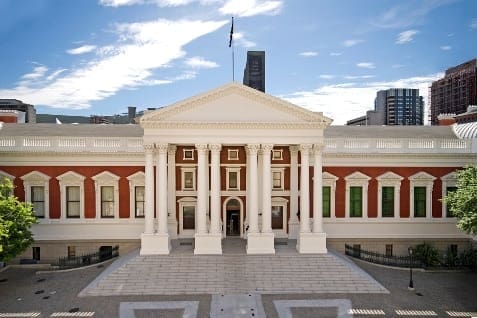South Africa’s parliament returned to work last Thursday with lawmakers to hold virtual meetings in both the National Assembly (NA), the National Council of Provinces (NCOP) and their committees.
Presiding Officers have agreed to draft guidelines and rules on how virtual committee meetings and voting must be conducted.
Virtual sittings of the National Assembly and the National Council of Provinces will deal with legislation and other matters needing approval or consideration from the Houses.
On Wednesday, parliament published the rules for virtual meetings.
The statement said these rules take into account procedures, precedents, practices and conventions developed by the House and the constitutional values underpinning an open, accountable and democratic society.
In virtual meetings, members of parliament will have the same powers, privileges and immunities as they ordinarily have in parliamentary proceedings and quorum requirements will be determined by the Constitution and the Rules, read the statement.
“Current rules on order in public meetings and in debates will apply, where relevant. The Presiding Officer of a House or the chairperson of a committee will have all the powers in virtual meetings as provided for in existing rules.”
Under its virtual meeting rules, the NA specifies that members who have accessed a virtual meeting through a secure link sent to their email address will be deemed present for the purposes of establishing a quorum, making a decision or voting on a matter.
“Members will be entitled to cast their votes either electronically, by voice or by having their vote recorded by their whips,” according to the virtual meeting’s rules.
“The procedure to be followed will be predetermined and directives will be announced in the meeting by the Presiding Officer or Committee Chairperson.
“Only Members who are present when a vote is called will be allowed to vote and the results of a vote will be announced and, where possible, the names of members and how they voted will be recorded in the Minutes of Proceedings. Members must ensure that their votes are correctly recorded.”
Parliament added in a statement that public participation and access to virtual proceedings must be made possible in a manner that is consistent with participatory and representative democracy and a virtual meeting must be live-streamed, wherever possible, the NA virtual meeting rules say.
The Secretary to Parliament, together with authorised officials and technical teams, is responsible for providing support to facilitate virtual meetings of the NA. “This includes technical support, maintaining minutes and records of proceedings and maintaining a system capable of verifying votes cast electronically or manually. Political parties must provide a signed copy of votes cast by their members within an agreed time-frame to ensure verification of results. This record may be submitted electronically.”
The NCOP’s rules for virtual meetings include house sittings, committee meetings, voting by Permanent Delegates, briefings of provincial legislatures by Permanent Delegates on matters affecting provinces, Select Committees’ consideration of mandates or matters affecting provinces and facilitation of public involvement on matters before Select Committees.
All House sittings and committee meetings will be in accordance with the NCOP’s programme. “The programme will give sufficient notice of House sittings. For meetings of the NCOP’s Select Committees, Committee Chairpersons will be responsible for issuing meeting notices. Documents relating to committee meetings and House sittings will be distributed by any electronic means to which Members have access.”
In House sittings, the Secretary of the NCOP will maintain a system capable of verifying votes of delegates, cast either electronically or by voice. In Select Committee meetings, this responsibility will rest with the officers responsible for supporting the committees.
“There must also be the facilitation of public involvement in matters before Select Committees by electronic means, which these committees will determine.”
The statement added that departments will brief select committees by electronic means, which committees will determine.
“Where matters affect provinces, members of the relevant committees of provincial legislatures may access select committee briefings from departments or other entities. Select committee chairpersons must inform provincial legislatures, other entities or members of the public of the date and time of these meetings, at least three days beforehand, or within a reasonable time. The place of briefings will be deemed to be the NCOP and Rules of the NCOP will apply.”
If relevant committees of provincial legislatures cannot access such briefings, NCOP Permanent Delegates will have an opportunity to brief their provincial legislatures, according to the statement.
The place of these briefings will be deemed to be the provincial legislatures and the rules of the particular provincial legislature will apply. The provincial legislature must also maintain minutes and records of proceedings, be responsible for technical support at its site and co-ordination of the meeting.
The full rules for virtual meetings can be accessed here
